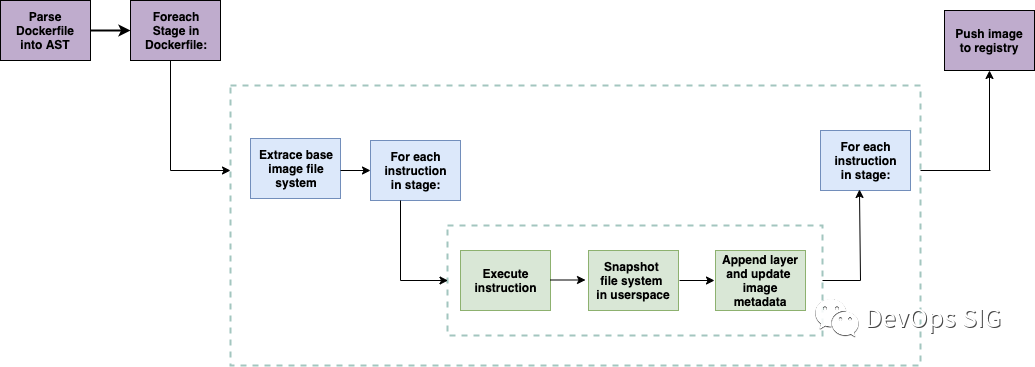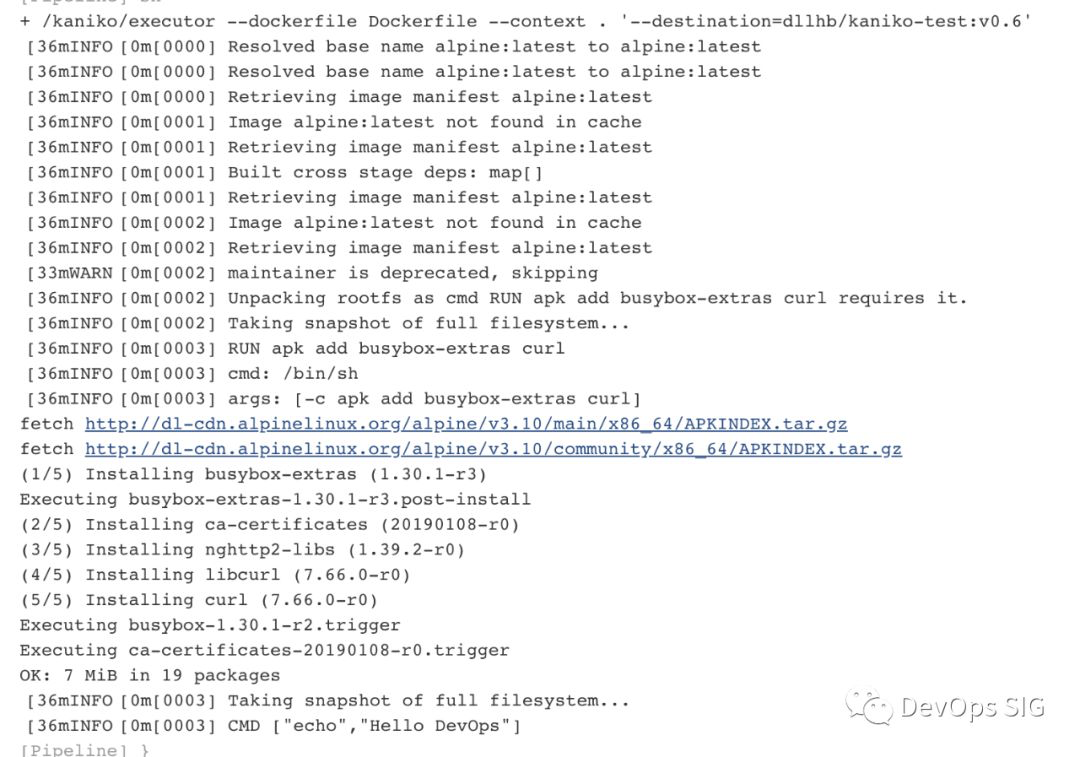前言
随着各企业上云进程的加速,用容器的方式来交付软件产品也变得越来越普遍,如何以更安全的方式来构建容器镜像,也就成了大家关注的话题。
docker 构建镜像
docker是最近几年非常火热的容器技术,用docker来构建容器镜像也是常用的方法,在具备构建容器镜像所需的两个要素(Dockerfile & 上下文)的前提下,用下述命令就能构建一个容器镜像出来
$ docker build -t your_registry/your_repository:tag .
然后用 docker push 将镜像推送到镜像仓库
$ docker push your_registry/your_repository:tag
现在DevOps 的CI/CD环境大多数都会运行在容器内,镜像的构成也是在容器内完成的。这时候,通常用以下两种方式来完成容器内构建镜像的工作:
第一:挂载宿主机的socket文件到容器内部
$ docker run -it -v /var/run/docker.sock:/var/run/docker.sock -v /tmp/kaniko:/tmp/kaniko docker
然后在容器内部用 docker build 构建镜像
$ docker build -t dllhb/kaniko-test:v0.1 .
Sending build context to Docker daemon 5.632kB
Step 1/4 : FROM alpine:latest
latest: Pulling from library/alpine
89d9c30c1d48: Already exists
Digest: sha256:c19173c5ada610a5989151111163d28a67368362762534d8a8121ce95cf2bd5a
Status: Downloaded newer image for alpine:latest
---> 965ea09ff2eb
Step 2/4 : MAINTAINER <devops008@sina.com xiaomage>
---> Running in 8a2b1dc13d6b
Removing intermediate container 8a2b1dc13d6b
---> bd535532278d
Step 3/4 : RUN apk add busybox-extras curl
---> Running in fc254ad3d088
fetch http://dl-cdn.alpinelinux.org/alpine/v3.10/main/x86_64/APKINDEX.tar.gz
fetch http://dl-cdn.alpinelinux.org/alpine/v3.10/community/x86_64/APKINDEX.tar.gz
(1/5) Installing busybox-extras (1.30.1-r3)
Executing busybox-extras-1.30.1-r3.post-install
(2/5) Installing ca-certificates (20190108-r0)
(3/5) Installing nghttp2-libs (1.39.2-r0)
(4/5) Installing libcurl (7.66.0-r0)
(5/5) Installing curl (7.66.0-r0)
Executing busybox-1.30.1-r2.trigger
Executing ca-certificates-20190108-r0.trigger
OK: 7 MiB in 19 packages
Removing intermediate container fc254ad3d088
---> 1bbe81600a67
Step 4/4 : CMD ["echo","Hello DevOps"]
---> Running in 4b92a6a4b37e
Removing intermediate container 4b92a6a4b37e
---> de712b8cd7e5
Successfully built de712b8cd7e5
Successfully tagged dllhb/kaniko-test:v0.1由于docker依赖于 docker daemon 进程, docker daemon 进程是一个 Unixsocket 连接,且 /var/run/docker.sock 文件是root权限,
$ ls -ltr /var/run/docker.sock
lrwxr-xr-x 1 root daemon 69 Nov 26 15:13 /var/run/docker.sock说明只有root权限才能访问 docker daemon 进程,在 docker daemon 无法暴露或者用户没有权限获取 docker daemon 进程的前提下,用 docker build 来构建镜像就变的非常困难了。
可能我们会想,docker build镜像无非就是需要docker命令能运行成功,只要在容器里面安装一个docker不就成功了吗?这也就是下面讲的第二种方法。
第二种: dind(docker-in-docker)
这种方式不需要挂载宿主机的socket文件,但是需要以 --privileged 权限来以dind镜像创建一个容器:
$ docker run --rm -it --privileged docker:18.06-dind然后在容器里面构建容器镜像并推送至远端仓库。
dind能够满足构建容器镜像的需求,但是从上面的命令看,有一个参数:--privileged 。意味这这个容器具有一些特权,他可能会看到宿主机上的一些设备,而且能够执行mount命令。
dind还有很多问题,只是方便docker开发人员来测试docker,所以官方也说running Docker inside Docker is generally not recommended。具体的可以看看这篇博文: https://jpetazzo.github.io/20...
上述两种方法,都能满足在容器内构建容器镜像且推送镜像至远端仓库的需求,但是从security角度来讲,需要root 权限(第一种方式),提供特权(第二种方式) 都使得风险增大,在Kubernetes 多租户的场景下,这种风险是不能接受的。那是否有一种不需要特殊权限,还能快速构建容器镜像的方法呢?答案就是下面将的Kaniko。
Kaniko
Kaniko是谷歌开源的一款用来构建容器镜像的工具。与docker不同,Kaniko 并不依赖于Docker daemon进程,完全是在用户空间根据Dockerfile的内容逐行执行命令来构建镜像,这就使得在一些无法获取 docker daemon 进程的环境下也能够构建镜像,比如在标准的Kubernetes Cluster上。
Kaniko 以容器镜像的方式来运行的,同时需要三个参数: Dockerfile,上下文,以及远端镜像仓库的地址。
Kaniko会先提取基础镜像(Dockerfile FROM 之后的镜像)的文件系统,然后根据Dockerfile中所描述的,一条条执行命令,每一条命令执行完以后会在用户空间下面创建一个snapshot,并与存储与内存中的上一个状态进行比对,如果有变化,就将新的修改生成一个镜像层添加在基础镜像上,并且将相关的修改信息写入镜像元数据中。等所有命令执行完,kaniko会将最终镜像推送到指定的远端镜像仓库。
Kaniko 构建镜像
下面看一个demo。
$ cat Dockerfile
FROM alpine:latest
MAINTAINER <devops008@sina.com xiaomage>
RUN apk add busybox-extras curl
CMD ["echo","Hello DevOps"]在kubernetes cluster上面创建一个pod,yaml文件如下:
apiVersion: v1
kind: Pod
metadata:
name: kaniko
spec:
containers:
- name: kaniko
image: gcr.io/kaniko-project/executor:latest
args: ["--dockerfile=/workspace/Dockerfile",
"--context=/workspace/",
"--destination=dllhb/kaniko-test:v0.4"]
volumeMounts:
- name: kaniko-secret
mountPath: /kaniko/.docker
- name: dockerfile
mountPath: /workspace/Dockerfile
subPath: Dockerfile
restartPolicy: Never
volumes:
- name: dockerfile
configMap:
name: dockerfile
- name: kaniko-secret
projected:
sources:
- secret:
name: regcred
items:
- key: .dockerconfigjson
path: config.json需要说明几点:
- args 部分
这部分就是上面所讲的,kaniko运行时需要三个参数: Dockerfile(--dockerfile),上下文(--context),远端镜像仓库(--destination)
- secret 部分
推送至指定远端镜像仓库需要credential的支持,所以需要将credential以secret的方式挂载到/kaniko/.docker/这个目录下,文件名称为config.json,内容如下:
{
"auths": {
"https://index.docker.io/v1/": {
"auth": "AbcdEdfgEdggds="
}
}
}其中auth的值为: echo"docker_registry_username:docker_registry_password"|base64然后创建pod,查看状态,并看log
$ kubectl -n kaniko apply -f kaniko.yaml
pod/kaniko created
$ kubectl -n kaniko get pods
NAME READY STATUS RESTARTS AGE
kaniko 1/1 Running 0 21s
$ kubectl -n kaniko logs -f kaniko
1 INFO[0000] Resolved base name alpine:latest to alpine:latest
2 INFO[0000] Resolved base name alpine:latest to alpine:latest
3 INFO[0000] Downloading base image alpine:latest
4 INFO[0001] Error while retrieving image from cache: getting fileinfo: stat /cachesha256:e4355b66995c96b4b468159fc5c7e3540fcef961189ca13fee877798649f51a: no such file or directory
5 INFO[0001] Downloading base image alpine:latest
6 INFO[0001] Built cross stage deps: map[]
7 INFO[0001] Downloading base image alpine:latest
8 INFO[0001] Error while retrieving image from cache: getting fileinfo: stat /cachesha256:e4355b66995c96b4b468159fc5c7e3540fcef961189ca13fee877798649f51a: no such file or directory
9 INFO[0001] Downloading base image alpine:latest
10 WARN[0002] maintainer is deprecated, skipping
11 INFO[0002] Unpacking rootfs as cmd RUN apk add busybox-extrascurl requires it.
12 INFO[0002] Taking snapshot of full filesystem...
13 INFO[0002] RUN apk add busybox-extras curl
14 INFO[0002] cmd: /bin/sh
15 INFO[0002] args: [-c apk add busybox-extras curl]
16 fetch http://dl-cdn.alpinelinux.org/alpine/v3.10/main/x86_64APKINDEX.tar.gz
17 fetch http://dl-cdn.alpinelinux.org/alpine/v3.10/community/x86_64APKINDEX.tar.gz
18 (1/5) Installing busybox-extras (1.30.1-r3)
19 Executing busybox-extras-1.30.1-r3.post-install
20 (2/5) Installing ca-certificates (20190108-r0)
21 (3/5) Installing nghttp2-libs (1.39.2-r0)
22 (4/5) Installing libcurl (7.66.0-r0)
23 (5/5) Installing curl (7.66.0-r0)
24 Executing busybox-1.30.1-r2.trigger
25 Executing ca-certificates-20190108-r0.trigger
26 OK: 7 MiB in 19 packages
27 INFO[0003] Taking snapshot of full filesystem...
28 INFO[0003] CMD ["echo","Hello DevOps"]可以用新生成的镜像创建个容器来测试一下:
$ docker run --rm dllhb/kaniko-test:v0.5
Unable to find image 'dllhb/kaniko-test:v0.5' locally
v0.5: Pulling from dllhb/kaniko-test
89d9c30c1d48: Already exists
2beaee649353: Pull complete
Digest: sha256:461233efe63a8f16e8630ab92a31795fb0932d2910669131d9973f258070cca5
Status: Downloaded newer image for dllhb/kaniko-test:v0.5
Hello DevOps可以看到输出了 HelloDevOps 这和Dockerfile所写是一致的。证明容器镜像已经构建完毕并已推送至远端仓库。
Kaniko 与Jenkins pipeline的集成
Jenkins pipeline代码如下:
podTemplate(
label: label,
serviceAccount: "your service account",
namespace: "your jenkins namespace",
yaml: """
kind: Pod
metadata:
name: kaniko
spec:
containers:
- name: kaniko
image: gcr.io/kaniko-project/executor:debug
imagePullPolicy: Always
command:
- cat
tty: true
volumeMounts:
- name: registry-secret
mountPath: /kaniko/.docker
- name: jenkins-home
mountPath: /home/jenkins
- name: maven
image: maven:3-jdk-8
imagePullPolicy: Always
command:
- cat
tty: true
volumeMounts:
- name: jenkins-home
mountPath: /home/jenkins
volumes:
- name: jenkins-home
persistentVolumeClaim:
claimName: jenkins-pvc
- name: registry-secret
secret:
secretName: regcred
items:
- key: .dockerconfigjson
path: config.json
"""
) {
node(label) {
container('kaniko') {
sh '/kaniko/executor -f Dockerfile -c . --destination=your_registry/your_repo:tag'
}
}
}触发构建查看jenkins log:
可以看出,Kaniko可以在无法获取宿主机docker daemon进程或者没有特殊权限的情况下构建容器镜像,这种方式是非常适合在Kubernetes平台上构建容器镜像的,而且易于集成到 DevOposJenkinspipeline 里。
参考资料: Kaniko github repo:https://github.com/GoogleCont...
dind 博文:https://jpetazzo.github.io/20...
来源: DevSecOps SIG
作者:小马哥




**粗体** _斜体_ [链接](http://example.com) `代码` - 列表 > 引用。你还可以使用@来通知其他用户。